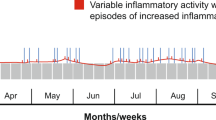Abstract
Guidelines for the treatment of asthma have identified that the primary goal of management is achieving good asthma control, thus reducing the risk of exacerbations. Research has shown, however, that the accuracy with which clinicians can estimate the adequacy of control may not be very good. Nor are clinicians accurate in estimating change in asthma control between clinic visits. Simple questionnaires to measure asthma control are now available, and can be used to evaluate the adequacy of control and to monitor whether levels of control change between assessments. This article discusses selection of a questionnaire, interpretation of data obtained, and methods of administration.
Similar content being viewed by others
References and Recommended Reading
Global Initiative for Asthma (GINA): Global strategy for asthma management and prevention, 2006. Available at: http://www.ginasthma.org.Themostrecentinternationalguidelinesformanagementofasthma.
Boulet L-P, Phillips R, O’Byrne PM, Becker A: Evaluation of asthma control by physicians and patients: comparison with current guidelines. Can Respir J 2002, 9:417–423.
Juniper EF, Chauhan A, Neville E, et al.: Clinicians tend to overestimate improvements in asthma control: an unexpected observation. Primary Care Respir J 2004, 13:181–184.
Cockcroft DW, Swystun VA: Asthma control versus asthma severity. J Allergy Clin Immunol 1996, 98:1016–1018.
Bateman ED, Boushey HA, Bousquet J, et al.: Can guideline-defined asthma control be achieved? The Gaining Optimal Asthma Control Study. Am J Respir Crit Care Med 170:836–844.
Juniper EF, Wisniewski ME, Cox FM, et al.: Relationship between quality of life and measures of clinical status in asthma: a factor analysis. Eur Respir J 2004, 23:287–291.
Juniper EF, O’Byrne PM, Guyatt GH, et al.: Development and validation of a questionnaire to measure asthma control. Eur Respir J 1999, 14:902–907.
Nathan RA, Sorkness CA, Kosinski M, et al.: Development of the Asthma Control Test: a survey for assessing asthma control. J Allergy Clin Immunol 2004, 113:59–65.
Vollmer WM, Markson LE, O’Connor E, et al.: Association of asthma control with health care utilization and quality of life. Am J Respir Crit Care Med 1999, 160:1647–1652.
Pearson MG, Bucknall CE: Measuring Clinical Outcomes in Asthma: A Patient Focussed Approach. London: Clinical Effectiveness and Evaluation Unit, Royal College of Physicians; 1999.
Juniper EF, O’Byrne PM, Ferrie PJ, et al.: Measuring asthma control: clinic questionnaire or daily diary? Am J Respir Crit Care Med 2000, 162:1330–1334.
Bateman ED, Bousquet J, Braunstein GL: Is overall asthma control being achieved? A hypothesis-generating study. Eur Respir J 2001, 17:589–595.
Boulet L-P, Phillips R, O’Byrne P, Becker A: Evaluation of asthma control by physicians and patients: comparison with current guidelines. Can Respir J 2002, 9:417–423.
Juniper EF, Bousquet J, Abetz L, Bateman ED: Identifying “well-controlled” and “not well-controlled” asthma using the Asthma Control Questionnaire. Respir Med 2006, 100:616–621.
Juniper EF, Svensson K, Mörk AC, Ståhl E: Measurement properties and interpretation of three shortened versions of the asthma control questionnaire. Respir Med 2005, 99:553–558.
Juniper EF, Gruffydd-Jones K, Thomas M, Ward S: Developing an interviewer-administered version of the Asthma Control Questionnaire for children ≤ 10 years. Eur Respir J 2007, In press.
Guyatt GH, Juniper EF, Feeny DH, Griffith LE: Children and adult perceptions of childhood asthma. Pediatrics 1997, 99:165–168.
Juniper EF, Riis B, Juniper BA: Development and validation of an electronic version of the Rhinoconjunctivitis Quality of Life Questionnaire. Allergy 2007, Epuba head of print.
Pinnock H, Juniper EF, Aziz S: Comparison of postal vs supervised responses to the Mini Asthma Quality of Life and Asthma Control Questionnaires. J Clin Epidemiol 2005, 58:809–814.
Acquadro C, Conway K, Giroudet C, Mear I: Linguistic Validation Manual for Patient-reported Outcomes (PRO) Instruments. Lyon, France: MAPI Research Institute; 2004.
Author information
Authors and Affiliations
Corresponding author
Rights and permissions
About this article
Cite this article
Juniper, E.F. Assessing asthma control. Curr Allergy Asthma Rep 7, 390–394 (2007). https://doi.org/10.1007/s11882-007-0059-2
Published:
Issue Date:
DOI: https://doi.org/10.1007/s11882-007-0059-2




